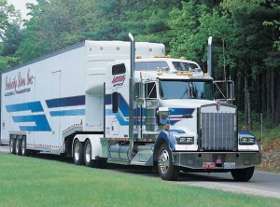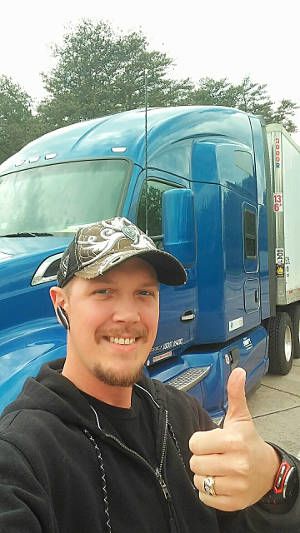Reefer Vs. Dry Van
Topic 13036 | Page 1
You could just go flat-bed and not have to worry about all that stuff!
No, seriously, at the end of the day all these jobs pay out a similar dollar amount. A reefer driver learns to get his ten hour break in while he's on a customer's property. Once you get out here you begin to learn what to expect at the different places you'll be going. A big part of your success is knowing how to manage your time. When I hear people complaining that they can't make any money at this, and then start laying the blame on their customers I immediately am skeptical. There are places I go that I know will take their sweet time. I get there early and get myself on the sleeper line. I rest and take it easy until they're done, and then I can determine whether it's best to go with eight or ten hours in my sleeper. A professional driver does his best to stay one step ahead of all the many things that trip everybody else up.
Reefer has the potential for longer runs, and that will make up for some of that waiting. You've just got to get out here and figure out how you want to manage things. Everybody is going to have trouble and not be sure how to handle those frustrating delays during their rookie year, but once you've got a handle on it you'll make some decent scratch no matter which type of freight you're pulling.
Reefer:
A refrigerated trailer.
HOS:
Hours Of Service
HOS refers to the logbook hours of service regulations.OWI:
Operating While Intoxicated

Here's my neophyte response, reefer is just dry van with temperature control. Sure you can look for drop and hook dry van, but you could have just as many delays while you hunt for that empty to hook after you've dropped, or wait for the shipper to load trailer you were supposed to hook. I have talked with some companies in Ontario Canada, one operated as dry van from the Toronto area to Laredo Texas hauling auto parts. Then they look for any load back to Ontario. A lot of those back hauls are produce from Texas and Mexico.
The typical advice is to go with the company and freight style that you think is the best match for you. Get a year's experience then branch out. There is nothing holding you back from trying something else.
Shipper:
The customer who is shipping the freight. This is where the driver will pick up a load and then deliver it to the receiver or consignee.
Dry Van:
A trailer or truck that that requires no special attention, such as refrigeration, that hauls regular palletted, boxed, or floor-loaded freight. The most common type of trailer in trucking.Reefer:
A refrigerated trailer.
Drop And Hook:
Drop and hook means the driver will drop one trailer and hook to another one.
In order to speed up the pickup and delivery process a driver may be instructed to drop their empty trailer and hook to one that is already loaded, or drop their loaded trailer and hook to one that is already empty. That way the driver will not have to wait for a trailer to be loaded or unloaded.
HOS:
Hours Of Service
HOS refers to the logbook hours of service regulations.
As a reefer driver I get lots of drop and hooks.
Also comchecks are not a big deal.
You learn what customers will delay you and what ones will get you in and out fast. Some will even take you up to 24 hours early.
Good and bad with everything.
Personally I love just pulling out the little nob to slide my tandoms instead of the bar that vans have.
But making sure your reefer is always full before dropping at a customer can be a pain sometimes and it seems my loads are always heavier than most the van drivers I talk to.
Reefer:
A refrigerated trailer.
Drop And Hook:
Drop and hook means the driver will drop one trailer and hook to another one.
In order to speed up the pickup and delivery process a driver may be instructed to drop their empty trailer and hook to one that is already loaded, or drop their loaded trailer and hook to one that is already empty. That way the driver will not have to wait for a trailer to be loaded or unloaded.
I only did reefer for 5 weeks while training. I've been dry van for the 4 months since then. Pretty limited experience but here goes; 1. Nobody at swift offered more cpm for reefers. 2. About half of the refers I pulled were drop and hook. Maybe 85% of dry van is drop and hook. 3. Reefer also deal with washout. 4. Dry sometimes deals with lumpers. I'm sure some veterans will fill in more blanks. These are just a few things I've experienced. Like Nate said, good and bad with everything.
Dry Van:
A trailer or truck that that requires no special attention, such as refrigeration, that hauls regular palletted, boxed, or floor-loaded freight. The most common type of trailer in trucking.CPM:
Cents Per Mile
Drivers are often paid by the mile and it's given in cents per mile, or cpm.
Reefer:
A refrigerated trailer.
Drop And Hook:
Drop and hook means the driver will drop one trailer and hook to another one.
In order to speed up the pickup and delivery process a driver may be instructed to drop their empty trailer and hook to one that is already loaded, or drop their loaded trailer and hook to one that is already empty. That way the driver will not have to wait for a trailer to be loaded or unloaded.

Most companies pay detention pay after the second hour. Detention pay may not totally compensate for cpm but it's better than nothing.
I always call the shipper or receiver and ask if they have overnight parking. Case and point I was at HEB in Buda, TX and parked at receiver overnight and never had to worry about burning my clock up even though it took the lumpers 6 hours to unload me. If there isn't any overnight parking get as close as possible to the shipper or receiver and try to get that 10 hours break in before arriving to destination. Some drivers put themselves in bad hour of service situations by being lazy lolly gagging and only running hard on the final day of the trip. Every once in a while you'll get that hot load with tight time restrictions, other that weather and mechanical issues there is absolutely no excuse for running out of time.
Reefer will always have freight because people got to eat.
Shipper:
The customer who is shipping the freight. This is where the driver will pick up a load and then deliver it to the receiver or consignee.
CPM:
Cents Per Mile
Drivers are often paid by the mile and it's given in cents per mile, or cpm.
Reefer:
A refrigerated trailer.

A lot of what you will experience with both reefer and dry van , will be dependent on the company you work for, and the customer you service. The company I work for has 3 divisions, reefer, dry van, and flat bed.
While flad bed can require some additional training for safety purposes, it's pretty easy to learn to haul reefer. My company will allow a driver to bounce back and forth hauling both reefer and dry van, making the driver more versatile, and allowing them to have access to more freight. You might explore this option, which will give you experience with both, and help you decide which is best for you.
I have hauled dry van loads in a reefer as well. It's simply a matter of turning off the refrigeration unit, while hauling dry freight.
Some customers haul both temperature controlled as well as dry freight, so if you work for a company that services a variety of freight, you may find yourself getting to haul both. In some cases, the customer only allows reefer trailers on their property, so they can use them for both refrigerated items as well as dry freight.
As for wait times on reefer versus dry van, reefer most likely will have more live load/unloads, however you can find yourself waiting for extended periods even with dry van. It's not so much a problem with the freight involved, as it is a lack of organizational skills amongst management at a particular company.
Then again, sometimes it's not a management problem at all, but rather a minimum number of docks available, and you find yourself waiting in line behind other drivers who arrived ahead of you. These situations are typical, if the company's building is really old or limited in size.
I am fortunate to work for a company that has plenty of trailers, and offers the customers a discount for pre loading our trailers, which makes for quick drop and hooks most of the time. I consider this a job perk of sorts that keeps me moving, and it's really valuable in maximizing your W-2's at the end of the year.
Dry Van:
A trailer or truck that that requires no special attention, such as refrigeration, that hauls regular palletted, boxed, or floor-loaded freight. The most common type of trailer in trucking.Reefer:
A refrigerated trailer.
Drop And Hook:
Drop and hook means the driver will drop one trailer and hook to another one.
In order to speed up the pickup and delivery process a driver may be instructed to drop their empty trailer and hook to one that is already loaded, or drop their loaded trailer and hook to one that is already empty. That way the driver will not have to wait for a trailer to be loaded or unloaded.
OWI:
Operating While Intoxicated

I received a lot more feedback on this subject than I had anticipated. Hats off to everyone that took the time to reply! I wanna maximize my time (obviously LOL) and learned on a road-trip from Indy to Myrtle Beach that teaming isn't really a viable option. I discovered I have trouble sleeping in a moving vehicle so I'm feeling out my options.
Again, thanks for the insight! Much appreciated.

Hello, I've been combing info from various resources & had a few questions concerning reefer & dryvan.
Its my understanding that reefer has more consistent freight & typically a small cpm premium over dryvan , however...
I hear horror stories about drivers waiting hours for live loads/unloads comchecks to pay for lumpers & running out of hours while waiting for freight to be lumped. On top of all this then being forced to move for the night by security after the shipper/receiver ran them out of hours.
Does the small cpm premium & "consistent" freight balance out all of the time lost? I feel like drop & hook (albeit less consistent) may be better in regards to time management & potential freight (overall) when you don't have to be ran out of hours & wait another 10 before fetching a dispatch.
Does anyone have any insight they would be willing to share in regards to the pro's & con's of Reefer vs. Dryvan?
I was leaning towards persuing reefer but am troubled by the wait time (Time the wheels aren't turning/making money) and potential HOS violations. Are these concerns justified?
Thanks.
I trained pulling Prime reefer, but I went over to Tennant division of Henderson, pulling dry van and I love it. Most of the customers are near the interstate. When I was training on prime reefer, a lot of the shippers were in the backwoods of some rural state and the receivers had very tight places to back into. Not to mention having to drive all night bro make the appointments, just to sit and wait. Most of our dry van customers are 1st come, 1st serve. And drop and hook is always nice
Shipper:
The customer who is shipping the freight. This is where the driver will pick up a load and then deliver it to the receiver or consignee.
Interstate:
Commercial trade, business, movement of goods or money, or transportation from one state to another, regulated by the Federal Department Of Transportation (DOT).
Dry Van:
A trailer or truck that that requires no special attention, such as refrigeration, that hauls regular palletted, boxed, or floor-loaded freight. The most common type of trailer in trucking.Dryvan:
A trailer or truck that that requires no special attention, such as refrigeration, that hauls regular palletted, boxed, or floor-loaded freight. The most common type of trailer in trucking.CPM:
Cents Per Mile
Drivers are often paid by the mile and it's given in cents per mile, or cpm.
Reefer:
A refrigerated trailer.
Drop And Hook:
Drop and hook means the driver will drop one trailer and hook to another one.
In order to speed up the pickup and delivery process a driver may be instructed to drop their empty trailer and hook to one that is already loaded, or drop their loaded trailer and hook to one that is already empty. That way the driver will not have to wait for a trailer to be loaded or unloaded.
HOS:
Hours Of Service
HOS refers to the logbook hours of service regulations.
I drove van while I was training and I drive reefer now and honestly the waiting really isn't that bad most of the time. Like O.S. said it's all about time management. For example today was a really crappy day I had a 3 stop load very unusual and all 3 stops were in the Baltimore Washington D.C. area. I started in Hagerstown made all 3 stops and then made a pick-up to head back West. Usually my wait times are less than 2 hrs.
Reefer:
A refrigerated trailer.
New Reply:
New! Check out our help videos for a better understanding of our forum features

















Preview:








 TT On Facebook
TT On Facebook
See also: Choosing A Truck Driving Job Part VI: Dry Van and Refrigerated Companies
Hello, I've been combing info from various resources & had a few questions concerning reefer & dryvan.
Its my understanding that reefer has more consistent freight & typically a small cpm premium over dryvan , however...
I hear horror stories about drivers waiting hours for live loads/unloads comchecks to pay for lumpers & running out of hours while waiting for freight to be lumped. On top of all this then being forced to move for the night by security after the shipper/receiver ran them out of hours.
Does the small cpm premium & "consistent" freight balance out all of the time lost? I feel like drop & hook (albeit less consistent) may be better in regards to time management & potential freight (overall) when you don't have to be ran out of hours & wait another 10 before fetching a dispatch.
Does anyone have any insight they would be willing to share in regards to the pro's & con's of Reefer vs. Dryvan?
I was leaning towards persuing reefer but am troubled by the wait time (Time the wheels aren't turning/making money) and potential HOS violations. Are these concerns justified?
Thanks.
Shipper:
The customer who is shipping the freight. This is where the driver will pick up a load and then deliver it to the receiver or consignee.
Dry Van:
A trailer or truck that that requires no special attention, such as refrigeration, that hauls regular palletted, boxed, or floor-loaded freight. The most common type of trailer in trucking.Dryvan:
A trailer or truck that that requires no special attention, such as refrigeration, that hauls regular palletted, boxed, or floor-loaded freight. The most common type of trailer in trucking.CPM:
Cents Per Mile
Drivers are often paid by the mile and it's given in cents per mile, or cpm.
Reefer:
A refrigerated trailer.
HOS:
Hours Of Service
HOS refers to the logbook hours of service regulations.OOS:
When a violation by either a driver or company is confirmed, an out-of-service order removes either the driver or the vehicle from the roadway until the violation is corrected.